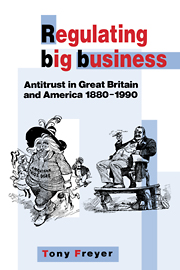Book contents
- Frontmatter
- Contents
- Preface
- Introduction
- 1 The response to big business: the formative era, 1880–1914
- 2 The divergence of economic thought
- 3 The political response
- 4 The courts respond to big business
- 5 The impact of World War I, 1914–1921
- 6 Tentative convergence, 1921–1948
- 7 A British antimonopoly policy emerges, 1940–1948
- 8 Uneven convergence since World War II
- Conclusion
- Notes
- Index
2 - The divergence of economic thought
Published online by Cambridge University Press: 21 January 2010
- Frontmatter
- Contents
- Preface
- Introduction
- 1 The response to big business: the formative era, 1880–1914
- 2 The divergence of economic thought
- 3 The political response
- 4 The courts respond to big business
- 5 The impact of World War I, 1914–1921
- 6 Tentative convergence, 1921–1948
- 7 A British antimonopoly policy emerges, 1940–1948
- 8 Uneven convergence since World War II
- Conclusion
- Notes
- Index
Summary
The opinions of publicists and professional economists provided a frame of reference for British and American lawmakers. Yet the extent to which judges, legislators, and administrators absorbed the ideas and formal theories of the wider culture was often not readily apparent. As a new form of enterprise, big business raised new questions of economic principle engendering considerable debate and divided opinion. Although laissez-faire or Free Trade provided a broad ideological framework for understanding the new phenomenon, the extent to which the principle shaped public discourse was ambiguous. In both nations the initial popular press and professional response during the 1880s and early 1890s questioned whether the combination movement threatened the competitive system to the point of requiring government action. Although vague concerning actual policy, American informed opinion favored intervention, whereas in the spirit of Free Trade the British declared that generally the government should not act. The second phase of the public reaction began with the turn-of-the century merger wave. By 1914 each country broadly supported a bureaucratic approach to combination, though British opinion condoned a much more modest one than its American counterpart. Ultimately, however, the most conspicuous difference was that American commentators blended moral and economic presumptions to distinguish “good” from “bad” trusts.
The British view was more benign because big business did not seem to threaten government stability. Confident that a rigid social-class system sufficiently curbed the pernicious effects of competition, British media and professional opinion perceived no significant threat to either Free Trade or the government itself.
- Type
- Chapter
- Information
- Regulating Big BusinessAntitrust in Great Britain and America, 1880–1990, pp. 43 - 75Publisher: Cambridge University PressPrint publication year: 1992



